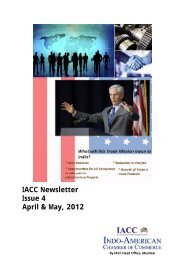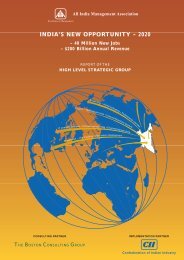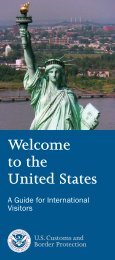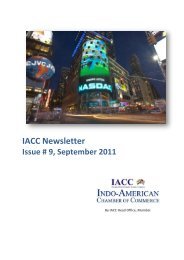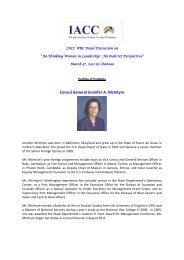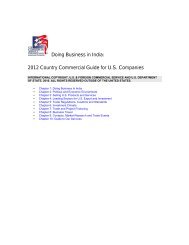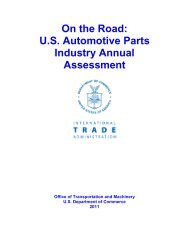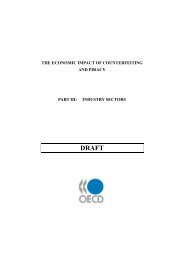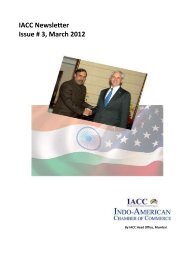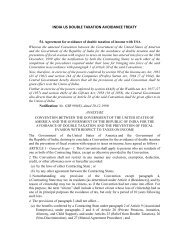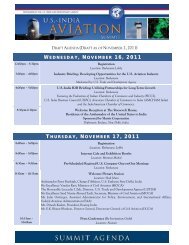Importing into the United States - Indo-American Chamber Of ...
Importing into the United States - Indo-American Chamber Of ...
Importing into the United States - Indo-American Chamber Of ...
You also want an ePaper? Increase the reach of your titles
YUMPU automatically turns print PDFs into web optimized ePapers that Google loves.
conditions of <strong>the</strong> order when it becomes final.<br />
If <strong>the</strong> President determines that entry of <strong>the</strong><br />
merchandise is not in violation of section 337,<br />
<strong>the</strong> bond is canceled.<br />
45. Importations of articles bearing <strong>the</strong> title,<br />
abbreviations, initials, symbols, emblems,<br />
seals, or badges of any subdivision of <strong>the</strong><br />
Department of <strong>the</strong> Treasury, or likeness<br />
<strong>the</strong>reof, are prohibited unless <strong>the</strong> subdivision<br />
has authorized <strong>the</strong> use of <strong>the</strong> symbol, initials,<br />
etc. See 31 U.S.C. 333(c).<br />
46. Artifacts/Cultural Property. A number of<br />
U.S. laws are applicable to importations of artifacts<br />
such as archaeological and ethnological<br />
objects. For example, U.S. law prohibits <strong>the</strong><br />
importation of pre-Columbian monumental<br />
and architectural sculpture and murals from<br />
countries in Central and South America<br />
without proper export permits from <strong>the</strong><br />
country of origin. U.S. Customs will not accept<br />
an export permit from a third country. Also,<br />
importations of certain archeological and<br />
ethnographic material from El Salvador,<br />
Guatemala, Peru, Mali, and Canada are specifically<br />
restricted from entering <strong>the</strong> <strong>United</strong> <strong>States</strong><br />
unless <strong>the</strong>y are accompanied by an export certificate<br />
issued by <strong>the</strong> country of origin. The U.S.<br />
Customs Service has published import restrictions<br />
on objects and artifacts of this nature in<br />
<strong>the</strong> Federal Register; <strong>the</strong>se restrictions may also<br />
be viewed at <strong>the</strong> U.S. Information Agency’s<br />
Web site, www.usia.gov/education/culprop.<br />
These restrictions are aimed at deterring <strong>the</strong><br />
pillage of o<strong>the</strong>r countries’ cultural heritage and<br />
at fostering opportunities for access to cultural<br />
objects for legitimate scientific, cultural, and<br />
educational purposes.<br />
Federal law also prohibits <strong>the</strong> importation<br />
of any article of cultural property stolen from<br />
museums or from religious or secular public<br />
monuments. Importers should be aware that a<br />
treaty exists between <strong>the</strong> <strong>United</strong> <strong>States</strong> and<br />
Mexico on cultural property recovery.<br />
Would-be buyers of such property should be<br />
aware that, unlike purchases of customary<br />
tourist merchandise, purchases of cultural<br />
objects do not confer ownership should <strong>the</strong><br />
object be found to be stolen. The U.S. National<br />
Stolen Property Act may be applicable in such<br />
cases, particularly if a country of origin<br />
declares by law that it owns all cultural objects,<br />
known or unknown, within its present-day<br />
political boundaries.<br />
Purveyors of such merchandise have been<br />
known to offer fake export cerificates. Prospective<br />
buyers should be aware that Customs<br />
inspectors are expert at spotting fraudulent<br />
export certificates that accompany cultural<br />
property. Customs inspectors will also examine<br />
declaration forms to determine whe<strong>the</strong>r any<br />
false information has been entered, since this<br />
also constitutes a violation.<br />
For current information about countries<br />
for which <strong>the</strong> <strong>United</strong> <strong>States</strong> has issued specific<br />
import restrictions, contact <strong>the</strong> <strong>United</strong> <strong>States</strong><br />
Information Agency, Washington, DC, Tel.<br />
202.619.6612, or visit <strong>the</strong> agency’s Web site:<br />
www.usia.gov/education/culprop. For information<br />
about how <strong>the</strong>se restrictions are enforced,<br />
contact <strong>the</strong> U.S. Customs Service Intellectual<br />
Property Rights Branch, Tel. 202.927.2330.<br />
47. <strong>United</strong> <strong>States</strong> Trade Representative<br />
Actions. As authorized by <strong>the</strong> Trade Act of<br />
1974, <strong>the</strong> <strong>United</strong> <strong>States</strong> Trade Representative<br />
(USTR) administers Section 301 complaints<br />
against foreign unfair trade practices that harm<br />
U.S. exporters. USTR actions that may directly<br />
affect U.S. importers include <strong>the</strong> suspension of<br />
concessions. For example, <strong>the</strong> USTR may suspend<br />
<strong>the</strong> normal-trade-relations rate of duty<br />
and substitute a substantially higher rate of<br />
duty on designated products from a foreign<br />
country that is found to be discriminating<br />
against U.S. products.<br />
Importers and Internet shoppers should<br />
monitor <strong>the</strong> USTR web site (http://192.239.92.<br />
165/index.html) on a regular basis to determine<br />
whe<strong>the</strong>r <strong>the</strong>ir products may become subject to<br />
a substituted rate of duty. The USTR will normally<br />
propose a list of products and provide a<br />
comment period for businesses that may be<br />
affected by a higher duty rate.<br />
The International Trade Administration at<br />
<strong>the</strong> Department of Commerce has set up a notification<br />
system that will advise importers of<br />
USTR actions that may affect imported products.<br />
Importers who wish to receive such notification<br />
should sign up at <strong>the</strong> following URL:<br />
http://www.ita.doc.gov/td/industry/otea/301-<br />
alert/form.html.<br />
84 U.S. CUSTOMS SERVICE



